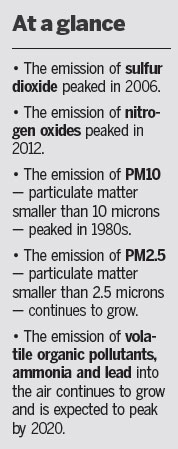But more time is needed for air quality to be as good as that of Western nations, experts say
Emissions of major air pollutants are expected to begin to decline in five to 10 years as part of a reduction in total emissions, but more time will be needed for the environment in China to significantly improve, a recent study concluded.
Volatile organic pollutant emissions are expected to climb and reach their high point by 2020, when ammonia and lead emissions into the air will also peak, according to research by the Research Institute of Resources and Environment Policies at the State Council's Development Research Center, People's Daily reported on Saturday.

Volatile organic pollutants, some of which are harmful to health, are a variety of chemicals emitted as gases from certain solids or liquids. They are a major air pollutant with an emission cap in Beijing.
The research showed sulfur dioxide emissions have declined since peaking in 2006, and the emission of nitrogen oxides is estimated to have peaked in 2012.
But the accumulated emission of the other major air pollutants will reach the maximum during the period of 2016 to 2020.
The emission peaks will come sooner than previously thought "because of the combined effects of slower economic growth, optimization of industrial structure and the strict control measures in curbing pollution in the country," said Chen Jianpeng, one of the writers of the study, according to the People's Daily report.
However, that these emissions will begin to decline does not mean the pollution will immediately end or even significantly decline, it said.
Developed countries experienced the same air pollution in their development, especially in the 1960s and 1970s, and it took them about 30 years to reduce the pollution, said Gao Shiji, head of the research institute and also a writer of the study.
"Based on the international experiences in controlling air pollution, China will need another 20 years to reach air quality as good as what Western countries now have," he told People's Daily.
Chang Jiwen, deputy head of the institute, and not a participant in the study, told China Daily on Sunday that he disagrees with the findings on air pollution emission peaks, saying they represent these researchers' opinion and not the institute's.
Feng Haibo, head of Hebei Provincial Academy of Environmental Sciences, said the current reins on air pollutants could cause emissions to the peak earlier, adding that China has conducted national research on this peak.
